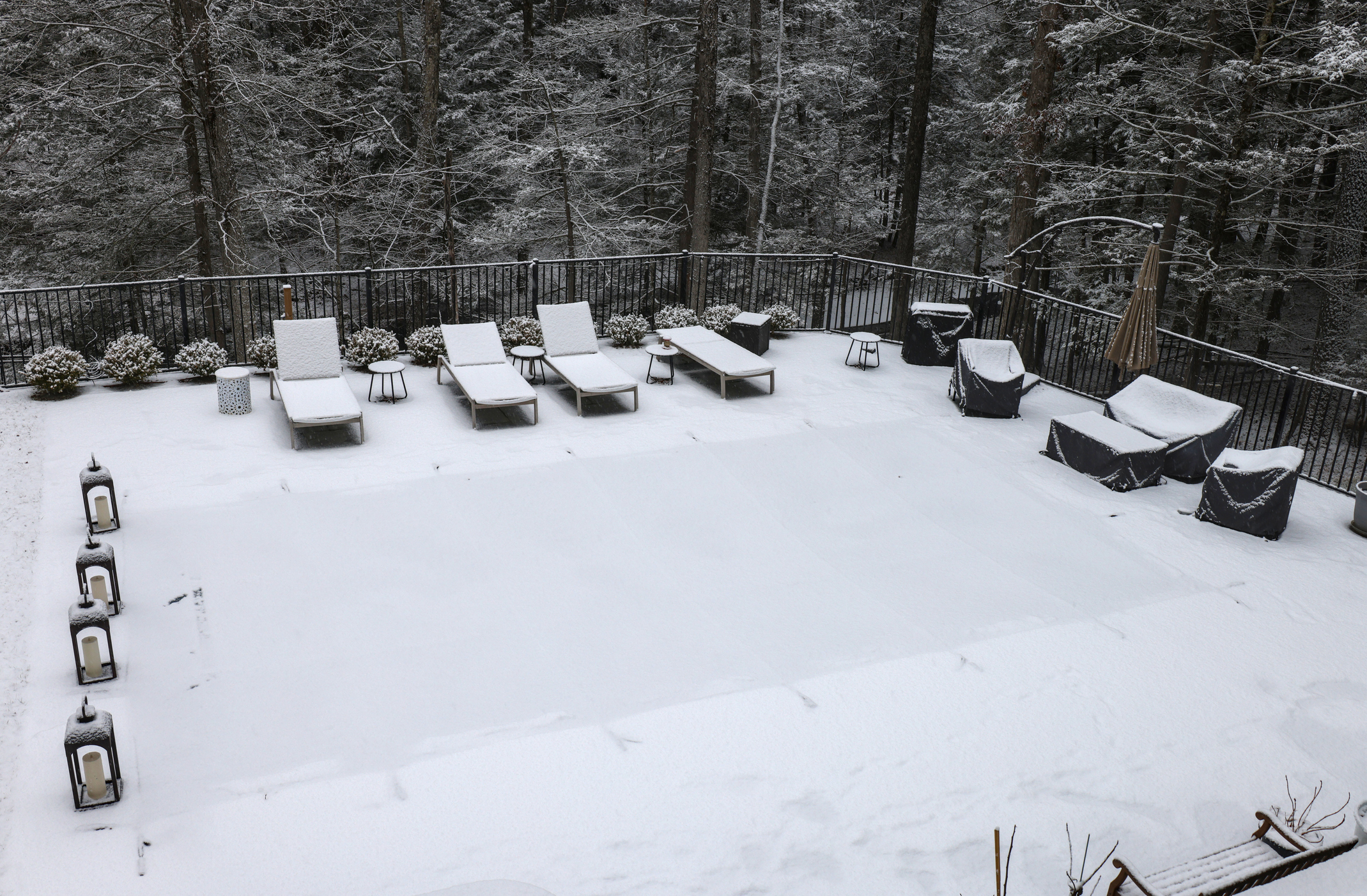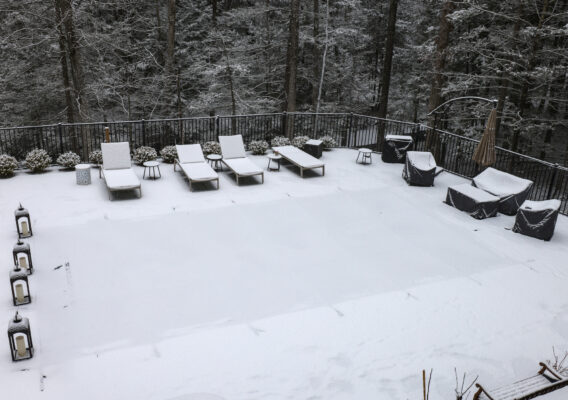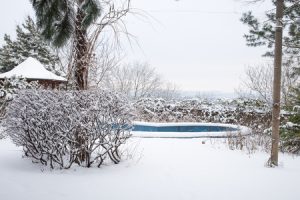
Table of Contents
You can avoid common springtime headaches like algae buildup, leaks, and malfunctioning pumps or filters by keeping an eye on your pool cover, water chemistry, and equipment. Additionally, winter is the perfect time to plan for upgrades or repairs to enhance your pool’s efficiency and performance for the upcoming season.
In this guide, we’ll walk through essential winter pool maintenance tips to help you protect your investment and ensure an easy transition into swim season.
Monitor Your Pool Cover Throughout Winter
Keeping a close eye on your pool cover throughout the winter helps prevent damage, protects your pool from contaminants, and ensures a stress-free opening in the spring. Snow, debris, and shifting covers can weaken the structure, leading to costly repairs.
Clearing Snow and Debris
Heavy snow and debris can put excessive strain on your cover, causing it to sag, stretch, or tear. Use a soft broom or pool cover pump to clear off snow and excess water—avoid sharp tools that could puncture the cover. Keeping it free of leaves and branches also prevents decay and staining. Learn more about Why You Should Remove Snow from Your Pool Cover.
Inspecting for Damage
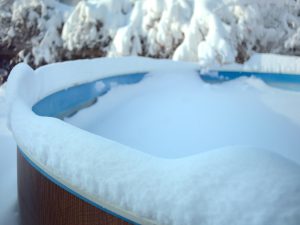 Winter weather can cause rips, sagging, or loose anchors that compromise the cover’s effectiveness. Regularly check for:
Winter weather can cause rips, sagging, or loose anchors that compromise the cover’s effectiveness. Regularly check for:
- Tears or holes that should be patched before they worsen.
- Areas sagging with water or debris that need adjustment.
- Loose or displaced anchors that should be re-secured.
Adjusting Water Bags or Safety Cover Straps
For solid winter covers, check that water bags are full and properly placed to keep the cover secure. If they deflate or shift, the cover may sag or allow debris in.
For mesh and solid safety covers, ensure that straps remain tight and evenly stretched to prevent the cover from dipping into the pool. Wind and weather can loosen them over time, so periodic tightening is key. By maintaining your pool cover throughout winter, you’ll protect your pool from damage and debris, ensuring a cleaner, easier opening when spring arrives.
Check for Leaks and Water Levels
Monitoring your pool’s water level throughout winter is crucial for identifying potential leaks and preventing structural damage. If left unchecked, leaks can lead to costly repairs and make reopening your pool more difficult in the spring.
Monitor for Ice Damage
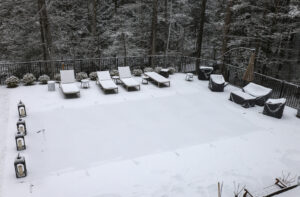
Fluctuating temperatures can cause ice expansion, leading to cracked tiles, pool walls, and skimmer damage. Maintaining the correct water level can help prevent this. If your pool is too full, ice expansion may put unnecessary pressure on surfaces. If the water level is too low, freezing temperatures may cause damage to exposed plumbing lines.
Look for Unusual Water Loss
While some evaporation is normal, a significant drop in water level could indicate a leak in the liner, plumbing, or pool structure. If you notice a sudden decrease in water levels, it’s best to investigate now rather than deal with extensive repairs later.
Inspect Pool Liner and Seams
Cold temperatures and shifting ice can cause pool liners to shrink, crack, or separate at the seams. A small tear can worsen over the winter, leading to a more expensive fix in the spring. If you spot any damage, consider scheduling a repair before the start of the swimming season.
Regularly checking your water levels and addressing issues early can prevent expensive repairs and ensure a smoother pool opening in the spring.
Maintain Proper Pool Chemistry During Winter

Even though your pool is closed, monitoring water chemistry during winter is essential to maintaining water quality and preventing damage to your pool and equipment. Without proper balance, your pool can develop issues like scale buildup, staining, corrosion, or algae growth that make reopening more challenging.
Balance pH, Alkalinity, and Calcium Hardness
Keeping pH, alkalinity, and calcium hardness within the proper range helps prevent scaling, staining, and corrosion. If these levels become imbalanced, your pool walls and equipment can deteriorate, leading to costly repairs.
- pH should remain between 7.2 – 7.6 to prevent scaling and protect the liner.
- Alkalinity should stay between 80 – 120 ppm to help stabilize pH.
- Calcium hardness should be monitored to prevent plaster and tile damage.
Check and Adjust Chlorine or Algaecide Levels
Maintaining proper chlorine or algaecide levels prevents algae and bacteria growth, keeping your water clear and reducing the workload when reopening in the spring. While chlorine demand is lower in winter, it’s still important to ensure your sanitizer levels remain within the recommended range.
Test Water Monthly
Even though your pool isn’t in use, monthly water testing helps you catch imbalances before they cause bigger problems. If you notice significant changes, adjusting the chemical levels now can save you from time-consuming maintenance when spring arrives. By maintaining proper pool chemistry during winter, you’ll protect your pool’s structure, liner, and equipment—ensuring a clean and hassle-free opening in the spring. Learn more about Winterizing a Pool: What Happens to Pool Water During the Winter.
Protect Your Pool Equipment from Damage
Winter can be tough on pool equipment, especially when exposure to extreme temperatures, moisture, and pests go unchecked. Regular inspections can prevent costly repairs and ensure that your system is in top shape when it’s time to reopen your pool.
Keep Rodents Away
During the colder months, rodents and small animals seek shelter in warm, enclosed areas—unfortunately, this often includes pool heaters, pumps, and other equipment. Mice and other critters can chew through wiring, damage components, and clog ventilation areas, leading to expensive repairs.
How to Prevent Rodent Damage:

- Seal any gaps or openings around your pool equipment area.
- Use rodent repellents or traps near equipment storage spaces.
- Keep equipment covers secure to prevent animals from nesting inside.
Learn more: How to Keep Rodents Out of Pool Equipment During the Winter
Check for Moisture Buildup in Equipment Areas
Excess moisture can cause rust, corrosion, and electrical issues in pool pumps, filters, and heating systems. If your equipment is stored in a pool shed or equipment pad, ensure there is proper ventilation to prevent condensation. Using moisture-absorbing materials like silica gel packs or dehumidifiers can help reduce the risk of damage.
Inspect Pumps, Filters, and Heaters for Cracks or Freezing Damage
Freezing temperatures can cause pool pipes, pumps, and filters to crack if they weren’t properly winterized. Check for any visible cracks or leaks before restarting your system in the spring. If you notice any damage, it’s best to replace or repair the equipment now instead of dealing with breakdowns later.
Plan for Equipment Upgrades or Repairs
Winter is the ideal time to evaluate your pool equipment and determine if any components need repair or replacement before the busy spring season. Addressing equipment needs now ensures a seamless pool opening while avoiding long wait times for service appointments.
Evaluate Your Pool System
Take time to assess your pump, filter, heater, and sanitation system to see if any parts are outdated, inefficient, or malfunctioning. If you’ve been dealing with high energy bills, poor filtration, or inconsistent heating, it may be time for an upgrade.
Consider Upgrading to Energy-Efficient Equipment
Investing in energy-efficient pool equipment can lower utility costs, improve performance, and extend the lifespan of your system. Consider these upgrades:
- Variable-Speed Pumps: Reduce energy consumption while maintaining optimal water circulation.
- Energy-Efficient Heaters: Heat pumps and solar heaters provide effective heating with lower operational costs.
- Salt Water Chlorine Generators: Offer consistent sanitization while reducing the need for harsh chemicals.
These upgrades can make pool maintenance easier and save you money in the long run.
Schedule Professional Maintenance Early
Pool service companies get overbooked in the spring, so scheduling inspections and pool maintenance during the winter ensures you get the service you need before the rush. Professional inspections help identify issues early, preventing unexpected breakdowns and costly repairs. By planning ahead and making necessary upgrades, you’ll ensure a stress-free pool opening and enjoy a more efficient, cost-effective pool season.
Review Your Pool Opening Checklist
A smooth pool opening starts with proper preparation. Before the warmer months arrive, take time to review your pool opening checklist to ensure everything is in place for a hassle-free start to the season.
Ensure All Necessary Supplies Are Ready
Having pool test kits, chemicals, and replacement parts on hand before opening day saves time and prevents last-minute trips to the store. Make sure you have:
- Pool test strips or liquid test kits to check water chemistry.
- Sanitizers, shock treatments, and algaecides for proper water balance.
- Replacement filter cartridges, skimmer baskets, and O-rings in case of wear and tear.
Check for Damage to Ladders, Railings, and Pool Accessories
Winter conditions can take a toll on pool accessories, so inspect ladders, railings, diving boards, and slides for signs of rust, cracking, or instability. Addressing any damage now prevents safety hazards and ensures your pool is fully functional when you’re ready to open it.
Plan Your Pool Opening Date and Schedule Professional Assistance
Getting on the schedule early for professional pool opening services ensures that your pool is properly set up for the season.

If you need help with water balancing, equipment checks, or pool cover removal, it’s best to book your service appointment in advance. See our free online guide: Off-Season Swimming Pool Checklist
Taking proactive steps during winter is the key to a stress-free pool opening in spring. Regularly monitoring your pool cover, checking for leaks, maintaining proper water chemistry, and scheduling equipment inspections can prevent costly repairs and delays. By planning ahead and addressing small maintenance tasks now, you’ll ensure your pool is clean, efficient, and ready to enjoy as soon as the season begins.
For over 55 years, The Swimming Pool Store has helped pool owners maintain and upgrade their pools for a hassle-free swimming season. Our expert team can assist with winter maintenance, equipment inspections, and pool opening services to ensure your pool is ready for spring. Contact us for all your swimming pool needs, including maintenance and spring pool openings.

